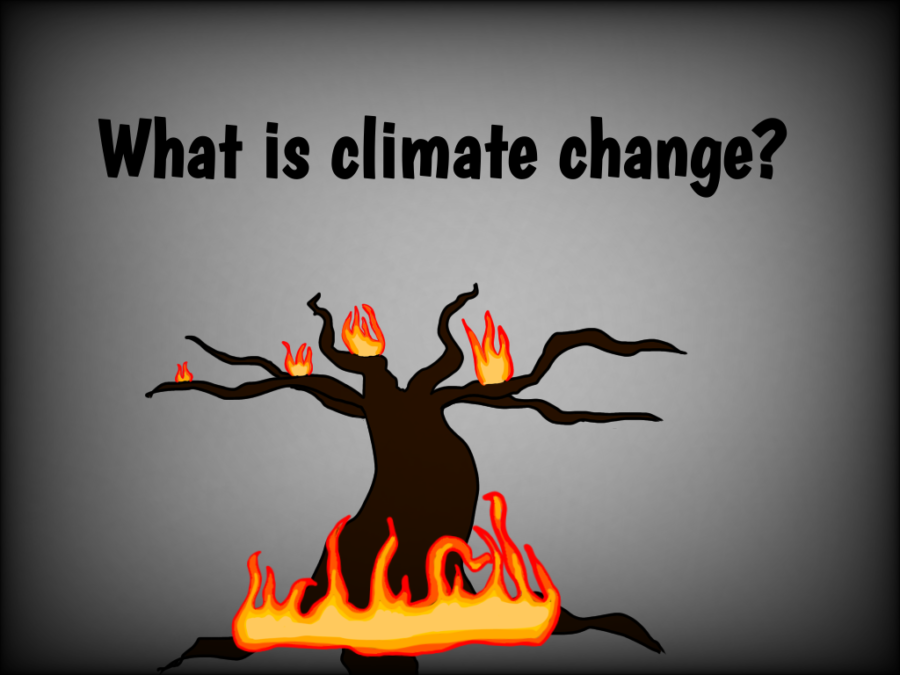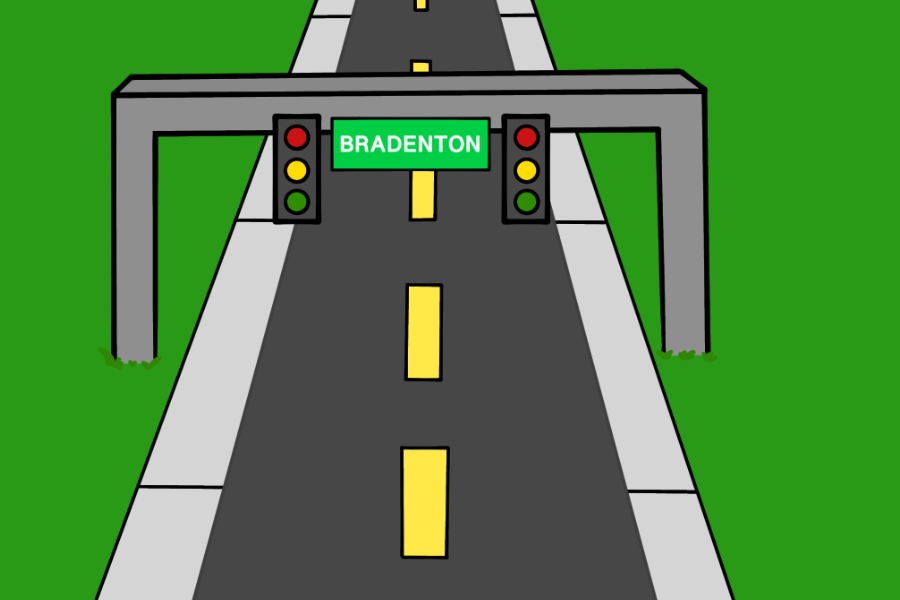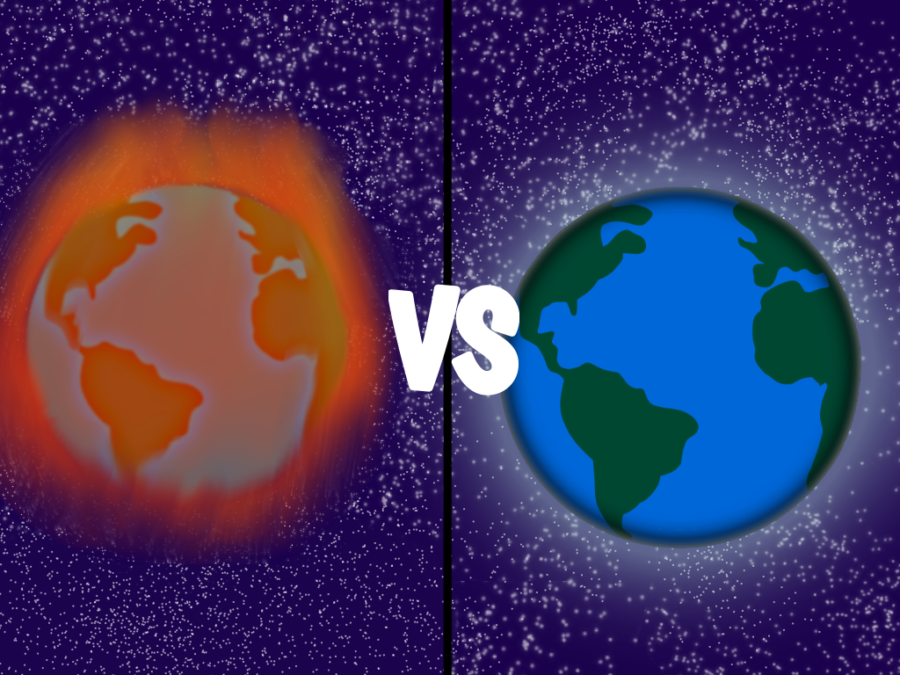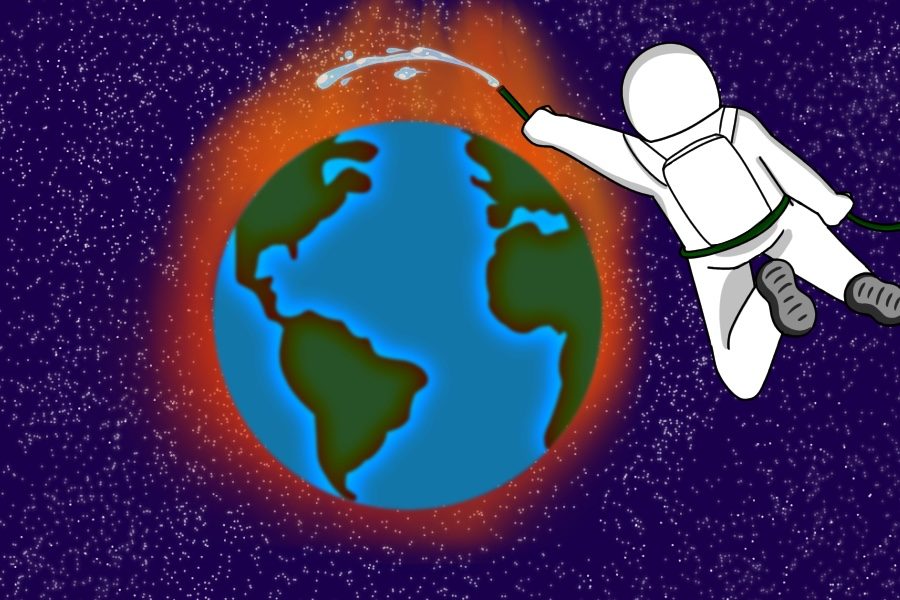Is Climate Change really upon us?
A lot of folks say Climate Change is getting real. So it's best you educate yourself now. Read on to see exactly what it is, why it's controversial, how it impacts our community (with views from local experts), and how to take action.
November 5, 2019
In 1910, President William Howard Taft founded Glacier National Park in Montana. At the time of its creation, its grounds were home to about 150 glaciers.
Now, there are less than thirty.
As people start to see drastic, fast-moving changes in the environment like these, they are taking action. Recently the Global Climate Strike took place. From New York City to Berlin to Istanbul to Sarasota, groups of people gathered together in protest, demanding attention and bringing awareness to the issue of Climate Change.
But here’s the billion-dollar question: is Climate Change really a thing? What is it, really, and why’s it so controversial? Is it happening here? What should we do?
These are some crucial questions that are on people’s minds, and if you ask most folks, they aren’t getting on the answers they need.
On Friday, September 20th, hundreds of local residents gathered at the John Ringling Causeway in Sarasota to bring awareness to this cause, many of them high school students. In fact, teenagers have taken the reins worldwide, and they’re not afraid to state their opinions.
If Climate Change wreaks the level of havoc it is forecasted to, teenagers, especially those who live in places like Florida, will have the most to lose. It has the potential to strengthen hurricanes, flood the state with rising sea levels, and further increase Florida’s extreme temperatures.
The worst part? Climate Change is an existential threat, meaning it literally threatens our existence.
Saint Stephen’s very own Dr. Suprenand is an expert on the issue. For over a decade, he has been researching ecosystems that are influenced by environmental drivers, and has a Ph.D. from the University of South Florida’s College of Marine Science. He has visited both Antarctica and the Arctic circle for research. It’s safe to say he’s fairly educated in matters of climate.
Suprenand has several predictions for the future. He said there may be “crashes in the ecosystem, and economics…impacts to our coastal communities… [and the possible] vanishing of animals and people who have subsisted off ecosystems for thousands of years.”
Moreover, he encourages people, especially teenagers, to think about Climate Change and speak out about their opinions.
Too often young people are silenced and ignored, but right now, they’re standing up for themselves and their beliefs. Especially those who live in places like Florida, with conditions so ripe for destruction. The Sunshine State’s susceptibility to hurricanes, flooding, and greater heat all contribute to its sensitivity to climate-based issues.
What is Climate Change anyway?
According to Dr. Suprenand, Climate Change is “a way that you can describe long-term, in this case rapid changes [in climate] that are out of the ordinary from anything that has been recorded in the last couple hundred if not over a million years.” Further, the definition includes not only temperature, but also weather. Think hurricanes, flooding, and general extreme weather. The weather won’t necessarily get worse, just less predictable.
For example, look at the polar vortex that traveled over the Midwest this past January. Currents of polar air that originated in the Arctic blasted into the American Midwest, and believe it or not, they were actually caused by warming temperatures. The polar jet stream is made by currents of air that run along the poles. In the Arctic, a hotter climate is weakening this current. This debilitated jet stream allows polar air to seep out, and come to America.
Skeptics argue that this onslaught of colder winters refutes the possibility of global warming, as things are actually getting colder. But according to sources, there two key points that discredit this viewpoint:
- While yes, it is true that winters are getting colder, this is actually just a repercussion of temperatures rising. Especially in the Arctic, where things are heating up at an accelerated pace, alterations to climate lead to polar air escaping and cooling down the rest of the world, along with the colder temperatures associated with glaciers melting.
- There’s a reason that scientists prefer the term “climate change” to the less accurate “global warming.” Climate change is a broad term. It can mean rising temperatures, but it can also mean falling ones and excess variation in weather patterns. Conversely, global warming is simply the rise of temperature. While most of the effects of climate change can be attributed to global warming, it is more accurate to refer to the climate crisis as being ushered in by climate change, since it encompasses all aspects of this epidemic as well as leaving less room for confusion. So when events such as the polar vortex happen, are they caused by rising temperatures and therefore global warming? Yes. But technically speaking, using a term like Climate Change is the better way to go.
In Florida, while there aren’t any polar vortexes, one tangible effect of climate change is rising temperatures. Florida is statistically the state most at risk to rising heat and humidity. These two factors, when coupled together, are what determine the heat index, or how hot it actually feels.
Take Miami. The number of danger days (days with a heat index over 105 ̊F) that The Magic City will face over the coming years is drastically increasing. In 2000, the number was just 24 per year. In 2030, that number is expected to increase by nearly six times, coming in at 126 danger days per year. In 2050, it will be 151 danger days, That’s over forty percent of a whole year.
The National Weather Service lists heat as the most common weather-related death in America. Danger days can lead to a whole host of health problems, such as dehydration, kidney failure, heart failure, and heatstroke. Couple that with Florida’s high concentration of the elderly, who are more susceptible to heat-related illnesses and deaths, and one can see how incredibly detrimental rising temperatures will be for the Sunshine State.
So what is it, exactly, that’s causing this climate crisis? It must have been some crazy anomaly, right? Well, the answer is not as shocking as one might expect.
It’s actually a naturally occurring process called the greenhouse effect. Gases in the atmosphere trap heat in the form of solar energy and send it back towards earth. Without human interference, the greenhouse effect acts naturally to keep earth warm enough to sustain life.
But starting around the Industrial Revolution, Suprenand explains, “we’ve seen rapid changes in the global mean temperature as well as carbon dioxide concentrations … meaning there are a lot of ways in which things like cars and gasoline, and all the other refined products that started to basically explode in production at the same rate as the human population are affecting Earth.”
Gases such as carbon dioxide, methane, and nitrous oxide have been produced in excess, and they end up in the atmosphere, trapping more heat than necessary and sending it back to earth. These gases all contribute heavily to the greenhouse effect.
To see a more in-depth analysis of what these gases do and why there is too much of them in the atmosphere, check out this page from NASA’s website.
According to Suprenand, Climate Change is an anthropogenic, or human-caused issue that will require a human-driven solution. In other words, this whole Climate Change thing isn’t going to just work itself out.
What does it mean for our area?
How will this global epidemic affect the Suncoast? Original artwork by Evanthia Stirou
One always hears about Climate Change in a global sense, especially due to that pesky term global warming.
From harrowing photos of the difference in size between an iceberg from 1970 to now, to the stomach-turning images of starving polar bears, to pictures of coral bleaching in Australia, climate change can seem like an issue that, while tragic, isn’t very personal.
However, that couldn’t be further from the truth. Florida needs to be taking climate change seriously, and the rally in Sarasota was a good first step. From dangerous heat, to unpredictable weather, to raging hurricanes, Floridians have a lot to lose.
One effect of Climate Change, Dr. Suprenand cautions against, is sea level rise. “If we have sea level rise and most of Florida is only a few feet above sea level, we’re talking about impacts to our coastal communities,” he warns. “I was talking to my friend the other day who works in Greenland and this massive melting [of icebergs and ice sheets] is going to mean up to six meters of sea level rise. Meters, not feet.”
Right here in Bradenton, rising sea levels are one of the county’s biggest concerns. In fact, Manatee County partnered with the Tampa Bay Regional Planning Council and NOAA (National Oceanic and Atmospheric Administration) to find out just how much the region will be affected.
The findings weren’t too optimistic, especially for those who live on the water. By 2030, the sea level could rise by over a foot. By 2100, the sea level in Tampa Bay could rise nearly nine feet.
An extra nine feet of water is obviously catastrophic to a community, and Manatee County will need to put a lot of money into building the proper infrastructure to withstand such a change. To see how certain local spots will be affected, check out the sea-level rise interactive map here generated by Manatee County. It shows just how much coastal areas stand to lose.
According to Suprenand, “We’re going to have to rethink the way that we live our lives because we can’t all live as wonderfully as people in the United States are now. It’s not possible in sheer numbers, and we only have so many resources, we only have so much space, so if things are changing and shifting there’s going to be a necessary response to those as well.”
But Climate Change means even more negative effects for Floridians. Here other impacts to the Sunshine State, according to statesatrisk.org:
- Longer mosquito season
- More dangerously hot days in summer
- Hotter summers which will last longer
- Less predictable weather
- More hurricanes with higher categories
- Coastal flooding
- Rising sea levels
- Droughts
That’s just to name a few. For a more complete list and some helpful infographics, click here.
To zero in on one of these effects, let’s look at hurricanes. They’re coming in faster and stronger than ever before.
As Dr. Suprenand explains, “if you have more energy in the ocean you’re going to have greater potential for more and stronger hurricanes.”
Hurricane Michael devastated the Florida Panhandle on October 10th, 2018. It didn’t affect the Suncoast, but had it landed here, it could just as easily have damaged our community. Hurricane Irma was another superstorm that had the potential to take lives and destroy property in the Tampa Bay area. It was forecasted to charge right through it, but turned away at the last minute.
Think about what would have happened if it hadn’t. People’s lives would certainly be over as they knew them before. With the number of these superstorms on the rise, it’s becoming increasingly likely that this could become reality. According to NOAA, hurricanes aren’t necessarily happening more often, but the storms that are hitting are getting worse. If and when a hurricane does zero in on the Bradenton area, it is much more likely to be a category four or five.
The Controversy: How can I be sure it’s real?
It’s a debate we’ve all heard of and probably all weighed in on: is Climate Change fact or fiction? Original artwork by Evanthia Stirou.
Any writer has to be aware of the consequences of an article on the topic of Climate Change meeting a readership that may see it differently. According to a survey conducted by Yale, only 69% of Americans believe in Climate Change.
While this is the majority, that still leaves 31% of Americans who are undecided or who completely reject the veracity of Climate Change. Therefore, it’s crucial to get the other viewpoint and allow sources from the 31% to have an opportunity to clarify their opinions.
According to one anonymous Saint Stephen’s student, “Statistically speaking, the last two winters we have had have been the coldest winters Florida has seen in a long time. That makes it hard for me to believe that global warming is even real.”
To speak to this, there’s a reason scientists prefer the term climate change to global warming. Though there has been a general trend of warming over the past few decades, that doesn’t mean it’s the only thing happening. Climate change means that the weather trends will be more extreme than before, so looking at Florida’s cooler winters, or even the polar vortex over the Midwest (a current of cold, arctic air), those are actually proving the existence climate change rather than disproving it.
According to wri.org, as glaciers melt, they send polar, arctic air southward, and that is why things seem to be cooling down in the winter even as they heat up the rest of the year.
A few other sources reiterated that there’s just not enough evidence yet to make conclusions about changes in the climate. But this is not necessarily true. It is useful to check out this page on NASA’s website for evidence and statistics on the impacts and statistics of Climate Change.
Not only does NASA insist that Climate Change is an issue to be taken seriously, but senior officials in the U.S. Armed Forces recognize its veracity and state that it must be planned for as an issue of national security.
General Joseph F. Dunford Jr., former Chairman of the Joint Chiefs of Staff, said, “When I look at Climate Change, it’s in the category of sources of conflict around the world and things we have to respond to … it is very much something that we take into account in our planning as we anticipate when, where, and how we may be engaged in the future and what capabilities we should have.”
The truth is, maybe it would be easier if the non-believers’ evidence against Climate Change was stronger. While going around asking people why they thought it was a hoax, some part of your humble writer was secretly hoping that they would say something that resonated or made sense.
It would be much easier to not believe in Climate Change, because then people wouldn’t have to worry so much about it. Maybe that’s why people choose to disregard the science behind Climate Change— it’s easier for them to not have to deal with the scary facts at hand.
Nobody wants to hear that Climate Change will be irreversible by 2030. Nobody wants to hear that polar bears are going extinct, or that coral reefs are dying. Nobody wants to hear the harsh reality, because it’s easier to be cushioned by one’s worldview or political stance.
Dr. Suprenand likens the controversial status of the issue to a visit to the doctor.“If you go to the doctor and they say that you’re sick, it doesn’t matter if you believe them or not. The truth is, if 99 doctors tell you that you’re sick, then you probably are.”
In this case, the doctors are the scientists and the diagnosis is Climate Change. If you trust your doctor, shouldn’t you trust the scientists like Dr. Suprenand?
“I’ve done the work, I’ve had the education, I’ve done the research,” Suprenand said.
How can I take action?
With the reality as daunting as it is, everyone needs to do their part to save the Earth. Original artwork by Evanthia Stirou.
At this point, almost everyone has seen the jokes about using metal straws. While slightly uncouth, these jokes do raise a serious issue. Things like refusing a plastic straw at a restaurant, trying to reduce your waste production, or even driving an electric car, while valiant efforts, are not going to stop Climate Change. It’s a few big corporations that are producing excess pollution, greenhouse gases, and harmful chemicals.
So what can average people do to help?
One thing Dr. Suprenand would like to see happen is for the Saint Stephen’s community to tackle its carbon plastic problem. Realistically, this would be no easy task. Plastic bottles and plastic utensils, along with a whole host of other nonbiodegradable products, would all need to be replaced with more environmentally friendly options. Just because it’s not easy doesn’t mean it’s impossible, though.
“Smoothie King now uses biodegradable products,” Suprenand points out, and “Eckerd College, several years ago, developed a reusable tray that you can go get your lunch, use it and then put it back into the machine where it is washed for reuse.”
Additionally, people need to think about Climate Change in a global sense. Dr. Suprenand encourages Saint Stephen’s students to look at this issue in a broader context, in order to realize their potential as global citizens and scholars.
“There are a lot of cool things you do in the upper school, and one of those cool things is the IQ week trips,” Suprenand reminds the high schoolers. “You get to go to these places all over the world and the United States. Imagine if all of those opportunities to see and experience those places and their uniqueness was lost.”
One example he provides is that of the Inuits living in the Arctic, who are people who have subsisted directly from the land and the ocean for thousands of years. As ice melts and the Arctic ecosystem is increasingly battered, these people are impacted immensely.
Dr. Suprenand said, “the health of the [Arctic] ecosystem really foretells the health of those communities, and to think just about the animals’ health is one thing. But you also have to think [the Inuits] have to go on the ice to hunt, and so if the ice starts to be lost, or it’s unsafe because it’s so brittle, you’re talking about cutting off people who have one primary set of traditional food sources that no longer will be there.”
To let the Inuits die off thanks to environmental factors they had little to no hand in would be a tragic failure of the global bond and system all citizens of earth are supposed to share.
But probably the single best action teens can take is to make their voices heard, as they did at the rally in Sarasota. The truth is, young people have been wronged. They were born into a society where Climate Change has, in some cases, already begun to run its course. They deserve the chance to stand up for their health and safety, and they have the moral force to demand to be listened to. And while it can be scary to advocate for an issue that they know may not be received well, if they truly care about the cause, other’s opinions should be an afterthought.
Here’s a name that has been in the news a lot lately: Greta Thunberg. She’s a 16-year-old activist from Sweden who is not afraid to stand up for the cause she believes in. She is an inspiration to many, because she’s one of the few teenagers who is truly changing the world.
When she spoke at the World Economic Forum in January of this year, Thunberg said, “Our house is on fire. I am here to say, our house is on fire. Adults keep saying: ‘We owe it to the young people to give them hope.’ But I don’t want your hope. I don’t want you to be hopeful. I want you to panic. I want you to feel the fear I feel every day. And then I want you to act. I want you to act as you would in a crisis. I want you to act as if our house is on fire. Because it is.”






David Turner • Nov 5, 2019 at 7:42 pm
So often I’ve heard the argument that climate change is a natural phenomenon, not caused by human activity, implying that attempts we make to change it are a waste of time. I love that you opened the article with the reference to Glacier National Park: an excellent example that’s hard to dispute! Does it even matter what causes climate change? Human-caused or “natural fluctuation,” shouldn’t we do everything in our power to protect our future and conserve our national treasures?
John Turner • Nov 5, 2019 at 4:21 pm
A very well thought-out and convincing article on a critical topic.